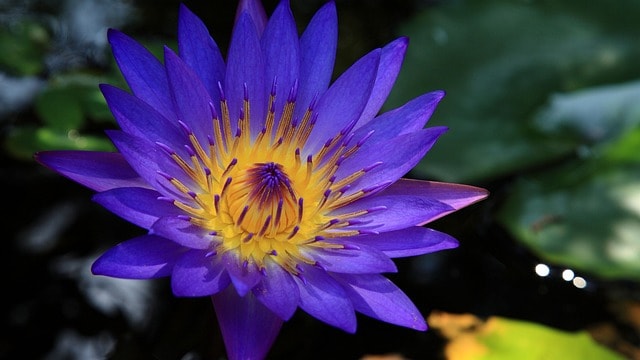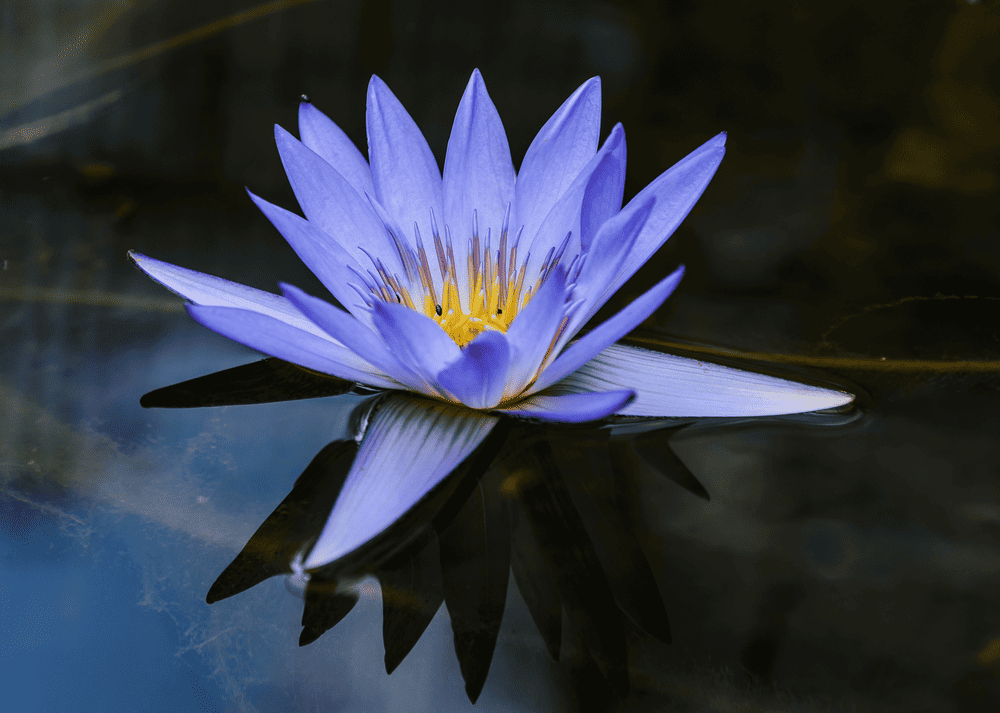Imagine sipping a warm, aromatic tea that has been praised since ancient times for its mystical and therapeutic properties. Blue lotus tea, made from the enchanting blue lotus flower, offers a unique sensory experience that has captivated civilizations for centuries.
In this journey through the world of blue lotus tea, we will explore its rich history, cultural significance, and versatile benefits, as well as the art of brewing the perfect cup.
Key Takeaways
-
Discover the allure of Blue Lotus Tea, a rare and endangered plant with potential health benefits.
-
Brew the perfect cup to experience relaxation, anti-anxiety effects, mild aphrodisiac properties & more.
-
Be mindful of side effects & legality when consuming this ancient remedy for modern stress.
The Allure of Blue Lotus Tea

The blue lotus, or blue lily flower, has been at the center of herbal remedies dating back to ancient Egyptian times. Revered as the official flower of the sun god Ra, the blue lotus was used in festivities and religious ceremonies, including the consumption of blue lotus wine, for its perceived mind-altering properties.
Today, the blue lotus continues to intrigue tea enthusiasts with its intoxicating fragrance and potential health benefits.
The blue lotus flower, scientifically known as Nymphaea caerulea, is a water-growing plant native to Egypt and parts of Asia.
Its roots drive deep into the earth beneath the water’s surface, while its vibrant blue flowers float gracefully above.
Often mistaken for the blue lily plant, this captivating flower is now classified as an endangered plant due to pollution, habitat destruction, and invasive species. This makes the consumption of blue lotus tea not only a delightful experience but also a tribute to a rare and precious plant.
Ancient Egyptian Connection
The ancient Egyptians held a deep connection to the blue lotus, believing that it acted as a gateway to the divine and enhanced third eye function. Employed in religious ceremonies and celebrations, blue lotus tea was thought to promote blessing, healing, and spiritual elevation.
The captivating scent of the flower and its mild psychoactive effects created a sense of euphoria, which was cherished in various spiritual practices.
In ancient Egyptian mythology, Nefertem, the god of the lotus blossom, was associated with the blue lotus. The flower symbolized life, immortality, and a connection to the afterlife, and was believed to enable communication with the spiritual realm. This rich spiritual history continues to captivate modern tea drinkers, adding an air of mystique to every cup of blue lotus tea.
Endangered Plant Status
The increasing rarity of the blue lotus flower is due to pollution from nitrogenous fertilizers and phosphates, as well as alterations in flood patterns.
Conservation efforts have been initiated to protect the blue lotus, including preserving and protecting populations at known sites, implementing recovery plans, and addressing habitat loss and environmental degradation.
While enjoying the exquisite taste and aroma of blue lotus tea, it’s pivotal to remember the need for ethical sourcing and supporting conservation efforts.
Brewing the Perfect Cup of Blue Lotus Tea

Brewing the perfect cup of blue lotus tea is a simple yet gratifying process, allowing you to savor the ancient flavors and aromas of this enchanting flower.
The key to a perfect cup lies in selecting quality ingredients, such as blue lotus tea bags, and mastering brewing techniques, which will ensure a delightful sensory experience when you brew blue lotus tea.
For selecting top-grade blue lotus flowers, consider sources like Animamundi Herbals, Pico Botanica, and my favorite store: Ceylon Organic Store.
For the brewing process, heat water until boiling, place the blue lotus flowers in a pot or mug, pour the boiling water over them, then cover the lid and steep for 15 minutes. The water’s quality can greatly affect the tea’s taste, hence the use of clean, filtered water is paramount for enhancing its flavors and smells.
Choosing Quality Ingredients
A high-quality blue lotus flower for tea should possess a sweet delicate aroma, a vibrant medicinal profile, and an intoxicating fragrance. To ensure that blue lotus flowers are ethically sourced, look for suppliers that mention hand-cut flowers, sustainably sourced practices, traceability, and ethical certifications such as Fair Trade or organic certifications.
Steering clear of counterfeit blue lotus tea ingredients is vital for a genuine experience.
Exercise caution when making a purchase, and opt for reputable sources that offer comprehensive information regarding the sourcing and quality of their ingredients. Be wary of unusually low prices, as this may be indicative of counterfeit or low-grade products.
Brewing Techniques
The most frequently employed brewing methods for blue lotus tea include:
-
Boiling water and steeping the dried blue lotus flowers for 10-15 minutes, using 2-3 tablespoons of flowers per 8-ounce cup of water.
-
Cold brewing or using warm water extraction below 118 degrees Fahrenheit will help to preserve the delicate flavors of the tea.
-
The optimal water temperature for brewing blue lotus tea is approximately 180°F (82°C).
Steeping the blue lotus tea for 5-10 minutes is recommended to guarantee optimal flavors and benefits.
Blue lotus tea can be brewed in a teapot, french press, or directly in a cup, providing flexibility for your preferred brewing method.
Experimenting with brewing techniques and adjusting to your personal taste preferences will ensure a perfect cup every time.
The Versatile Benefits of Blue Lotus Tea

The benefits of blue lotus flower tea include:
-
Enhanced relaxation
-
Lucid dreaming
-
Alleviation of anxiety
-
Mild aphrodisiac effects
This versatile herbal remedy has a captivating history and delightful taste.
While there is a lack of scientific evidence to back up the claim that blue lotus tea aids sleep or in lucid dreaming, tea enthusiasts remain fascinated by anecdotal reports of its effects. For me, I have more vibrant dreams when I drink blue lotus flower tea.
Additionally, its natural pain-relieving and antispasmodic properties make it a popular choice for those seeking relief from menstrual cramps and inflammation.
Lucid Dreaming and Relaxation
The potential of blue lotus tea to induce lucid dreaming and promote relaxation is rooted in its psychoactive properties. Though not fully understood, the dried blue water lily flower has been associated with psychedelic effects and lucid dreaming, making it an intriguing option for those seeking a mind-altering drink.
Many individuals incorporate the blue lotus flower extract or flowers into their diet to experience potential lucid dreaming effects, including the much sought-after lucid dreams.
This can be done by adding the flowers to hot water and brewing an herbal tea. As you sip this mystical brew, allow your mind to wander and explore the possibilities of lucid dreaming and deep relaxation.
Sleep Aid and Menstrual Support
Blue lotus tea has been found to possess natural pain-relieving effects with antispasmodic properties, which can help relieve menstrual cramps and inflammation.
It may also be an effective sleep aid due to the presence of compounds including nuciferine and aporphine, which offer antispasmodic effects and a calming sensation that may help induce more relaxed sleep.
The antispasmodic effects of blue lotus tea may also be beneficial in alleviating gastrointestinal problems such as dyspepsia.
Additionally, blue lotus tea has been found to be able to ease menstrual cramps and stabilize the menstrual cycle.
With its versatile benefits, blue lotus tea offers a holistic approach to wellness and relaxation.
Aphrodisiac Properties
The aphrodisiac properties of blue lotus tea have been celebrated since ancient Egyptian times, where the tea was believed to augment sexual desire, mood, and performance.
The compounds apomorphine and nuciferine present in blue lotus tea are purported to have aphrodisiac effects, though modern medical research has yet to confirm this.
Still, the allure of blue lotus tea as a natural aphrodisiac persists, with many individuals seeking to harness its potential effects on hormones and sexual pleasure.
As you sip this ancient brew, let its storied history of aphrodisiac properties ignite your imagination and passion.
Safety and Legal Considerations

While blue lotus tea offers an array of potential benefits, it is important to be aware of the safety and legal considerations surrounding its consumption. Potential side effects may include:
-
Euphoria
-
Hallucinations
-
Nausea
-
Dizziness
-
Vomiting
-
Dry mouth
-
Constipation
-
Potential interactions with certain medications
It is therefore advisable to start with a low dose and be attentive to your body’s reaction.
Blue lotus tea is legally permissible in India, Australia, and most countries in the European Union.
However, it is not legal for human consumption in several countries, including the United States and Russia, due to potential side effects.
Always consult local laws and regulations before consuming blue lotus tea, and consider alternative products such as massage oils or lotus tinctures if their consumption is restricted in your area.
Potential Side Effects
Potential side effects of consuming blue lotus tea include:
-
Euphoria
-
Hallucinations
-
Nausea
-
Dizziness
-
Vomiting
-
Dry mouth
-
Constipation
These side effects should be taken into account. Additionally, blue lotus tea may interact with prescription medications, particularly those used to treat diabetes.
It is advised to consult with a healthcare professional before consuming blue lotus tea if you are taking prescription medications.
Prolonged use of blue lotus tea may be associated with certain health risks, such as:
-
increased heart rate
-
hot flashes
-
dizziness
-
nausea
-
vomiting
-
dry mouth
-
constipation
-
potentially hallucinations and euphoria
Starting with a low dosage and being aware of any reactions experienced by the body can help mitigate these risks. Always pay attention to your body’s response and drink blue lotus tea in a responsible manner.
Legal Status in Various Countries

Although blue lotus tea is legal in many countries, it’s necessary to know about any restrictions on its consumption in specific areas.
Blue lotus tea is not recommended for human consumption in the United States and Russia. This is due to potential side effects it might cause..
In countries where blue lotus tea is restricted, alternative products such as massage oils or lotus tinctures may be available. These products can offer some of the relaxing effects of blue lotus without the psychedelic nature associated with its consumption.
Always consult local laws and regulations before using blue lotus products, and consider alternatives if necessary.
Tasting Notes and Flavor Profile

The tasting notes and flavor profile of blue lotus tea present a delightful and intriguing sensory journey. With its alluring and fragrant aroma, robust and earthy flavors, and subtle bitter and sweet notes, blue lotus tea provides a unique and memorable experience for tea enthusiasts.
The delicate floral aroma and the visual beauty of the flower unfolding and blooming again as it steeps in hot water create a captivating sensory experience, transporting you to ancient times and distant lands.
The complex flavors of blue lotus tea are further enhanced by its earthy and floral notes, offering a taste that lingers on the palate long after the last sip.
Earthy and Floral Flavors

The earthy and floral flavors of blue lotus tea blend harmoniously to create a rich and satisfying taste profile. The tea is characterized by:
-
A full-bodied, slightly bitter flavor
-
Root vegetable notes
-
An earthy aroma
-
A subtle floral taste with a mild sweetness and nutty undertones.
A perfect cup is guaranteed every time by trying out different brewing methods and tailoring them to your personal taste.
Enhancing the taste and smell of blue lotus tea may be achieved by adding honey, lemon, or other flavorings, or by blending blue lotus flowers with herbs such as lavender, rosemary, or chamomile for distinctive flavor combinations.
Aromatic Experience

The aromatic experience of blue lotus tea is an integral part of its overall appeal. Its intoxicating, sweet, and floral scent is both inviting and complex, capturing the essence of the blue lotus flower.
The blue lotus tea’s aroma significantly contributes to the overall drinking experience, enhancing the taste with its floral fragrance and creating a delightful sensory experience. Whether you are enjoying a quiet moment alone or sharing a pot of tea with friends, the enchanting aroma of blue lotus tea will transport you to a world of relaxation and serenity.
Summary
From its alluring history and cultural significance to its versatile benefits and captivating sensory experience, blue lotus tea offers a unique and enchanting journey for tea enthusiasts. As you explore the mystique of this ancient brew, remember to savor each sip, appreciate its rich heritage, and celebrate the precious nature of the blue lotus flower.
Frequently Asked Questions
What does blue lotus flower tea do?
Blue Lotus Flower Tea is a traditional remedy known to induce deep meditative energy, enhance third-eye function, and motivate lucid dreaming.
It has also been used for centuries recreationally and medicinally to reduce anxiety, improve sleep, assist with erectile dysfunction, and act as a natural aphrodisiac.
Is Blue Lotus tea good for sleep?
Blue lotus tea has been used in traditional medicine for thousands of years as a sleep aid and anxiety reliever. Its calming effects can help you drift off into a peaceful sleep, making it a good choice for those looking to improve their nighttime routine.
Does Blue Lotus show up on a drug test?
Blue Lotus itself is not detectable by urinalysis, however, most products labeled as Blue Lotus contain synthetic cannabinoids which are detectable and can result in a positive drug test after admitting to the use of Blue Lotus vape juice.
What is the historical and cultural significance of blue lotus tea?
Blue lotus tea has a long and meaningful history, with its use in medicinal remedies and religious rituals dating back to Ancient Egypt.
In the past, it has been consumed in certain parts of India and Thailand as well as by ancient Egyptians, Syrians and Thais for its mind-altering properties and to mark significant occasions.
How is blue lotus tea prepared?
Blue lotus tea is prepared by bringing water to a boil, adding the flowers to a pot or mug, pouring boiling water over them, covering and allowing it to steep for 15 minutes, then strain before drinking.
